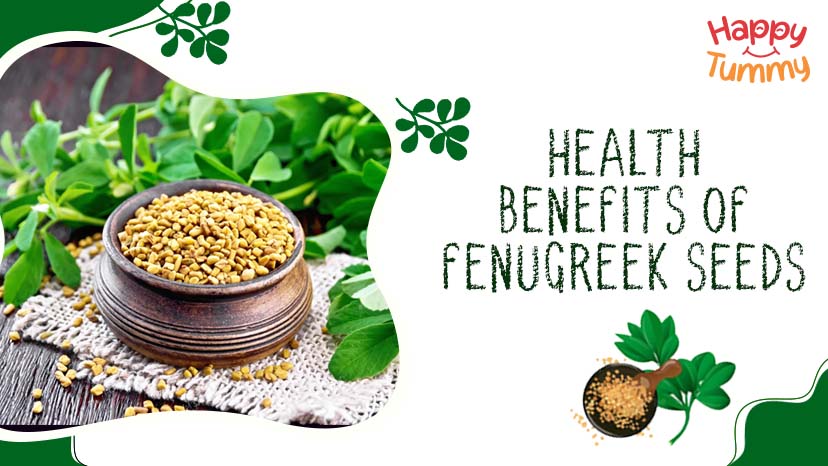Table of Contents
We frequently ignore the unsung heroes that have endured the test of time in a world flooded with trendy superfoods and health gimmicks. Fenugreek seeds, a popular spice in Indian cooking, provide outstanding health advantages.
Today, we highlight the fenugreek seed, a humble seed revered for its excellent health benefits since ancient times.
These little brown seeds are rich in macro- and micronutrients, including iron, magnesium, and vitamins.
Most importantly, it has a strong cultural significance in the Indian subcontinent and is believed to bring good luck when consumed during the festival of Diwali.
Therefore, these seeds improve your health and provide your diet with a dash of tradition and culture.
Let’s look at the miraculous health benefits of fenugreek seeds.
About Fenugreek Seeds (Methi Seeds)
Fenugreek, also known as Methi in hindi (Trigonella foenum-graecum), stands around 2–3 feet (60–90 centimetres) tall. It has green leaves, small white flowers, and pods containing small, golden-brown seeds, popularly known as Methi Dana.
Ancient Egyptians and Greeks used fenugreek seeds native to the Mediterranean and South Asia regions for medicinal purposes.
Due to their nutritious value and mildly sweet, nutty flavor, people frequently utilize seeds and powder in many Indian recipes.
It is also a typical household spice and thickening agent in various merchandise, including detergent and shampoo.
Health Benefits of Fenugreek Seeds (Methi seeds)
Popularly known as Methi Dana, these seeds are well known for their many health advantages, including controlling blood sugar levels, lowering cholesterol, improving digestion, and increasing milk production in nursing mothers.

Go on to explore the health benefits and gift yourself a Happy Tummy feel by including them in your regular diet regimen.
1. Fenugreek Seeds Aid Overall Digestive Health
Regarding digestive health, fenugreek seeds emerge as a natural powerhouse, ready to assist you in achieving balance and vitality.
The high level of soluble fibre in fenugreek seeds acts as a binding agent, bulky the intestinal content and facilitating its movement down the digestive tract. This helps manage acidity by promoting the secretion of digestive juices [1].
Fenugreek seeds are well known for relieving constipation, one of the most prevalent digestive problems.
The seeds’ soluble fibre draws water from the digestive system, softening the poop and allowing it to pass more quickly.
The seeds also contain a lot of mucilage, which forms a layer of protection surrounding the digestive system and lowers inflammation [2].
Additionally, fenugreek seeds are believed to have anti-inflammatory effects, making them helpful in lowering digestive tract irritation and easing Irritable and other bowel conditions.
The seeds also aid in nutrient absorption from food, which is essential for maintaining overall digestive health.
Aashirvaad Digestive Quotient
Often you could feel confused about your digestive quotient. Aashirvaad Digestive Quotient, however, makes everything easier. The digestion Quotient test, created by Aashirvaad Atta with Multigrains and a team of professional nutritionists, determines your digestion score on a scale 100. Use your scorecard to correctly plan your meals and assess your journey towards a Happy Tummy after taking this two-minute exam to get your Digestive Quotient.
Ultimately, consuming fenugreek seeds water daily on an empty stomach can boost your metabolism, which ultimately helps in weight reduction. It contains natural fibres that help reduce calorie cravings and suppress your appetite. These seeds give a feeling of stomach fullness which can reduce overeating and lead to weight loss.
2. Fenugreek Seeds Regulate Blood Sugar
You can control blood sugar levels naturally and effectively with seeds. They include a lot of soluble fibre, which slows down the blood’s absorption of sugar and carbs. This lowers blood glucose levels in people with diabetes.
Further, it helps to increase insulin sensitivity and action, lowering the blood sugar level [3]. You can have seeds or simply soak seeds in water to control blood sugar levels.
3. Fenugreek Seeds for Lactating Mothers
Lactating mothers widely use fenugreek seeds to enhance milk production in new mothers.
It contains phytoestrogen (a substance that increases estrogens in the body), which helps increase milk production in lactating mothers [4].
Drinking tea made from fenugreek seeds increases milk levels and helps infants gain weight.
4. Control Cholesterol Levels with Fenugreek (Methi seeds)
Fenugreek seeds contain flavonoids that lower our bodies’ bad cholesterol or LDL. Soaked fenugreek seeds amazingly reduce high cholesterol levels.
5. Beauty Benefits of Fenugreek (Methi seeds)
Fenugreek seeds provide advantages for aesthetics as well. Continue reading if you’re looking for tips to enhance the look and condition of your hair and skin.
It encourages hair development and nourishes the scalp when added to a hair mask. Rich in proteins, they can also help repair damaged hair.
Promoting hair growth is one of its remarkable properties. Crush seeds finely and mix with coconut oil for a fantastic hair mask. After letting the combination do its thing for a while, properly rinse. You’ll be astounded by the outcomes!
But that’s not all! Fenugreek seeds also nourish your hair and scalp deeply.
Fenugreek seeds oil can assist you in overcoming dandruff and itchy scalp issues if you use it regularly. Also, it lessens hair loss while strengthening the hair from its origins to the ends. Add a few teaspoons of fenugreek oil to your favourite shampoo or conditioner for an effortless application!
6. Fenugreek seeds also have anti-aging qualities
They can lessen the visibility of age spots, fine lines, and wrinkles. Combine seeds soaked with honey or aloe vera gel for a face pack. Use cool water to wash it off following 15 to 20 minutes. Your skin will seem refreshed, smooth, and flawless. Fenugreek seeds’ anti-inflammatory and antibacterial characteristics also help to treat acne and avoid blackheads. Apply a cotton ball dipped in warm fenugreek tea to your face to minimize pores while avoiding acne.
Fenugreek seeds should be essential in your beauty routine due to their numerous cosmetic advantages. Try them out and see for yourself how effective they are!
How to use Fenugreek Seeds?
So you’ve mastered the art of knowing the benefits of seeds. Now it’s time to move on to mastering the art of using them!
- As a Spice – Fenugreek seeds add an earthy, slightly sweet flavour to your dishes. Toast them in oil or dry roast them before grinding them.
- As a Hair Mask – Soak seeds overnight, grind them, and apply the paste to your hair and scalp. This helps in nourishing your hair and treating dandruff.
- As a Face Pack – Mix seeds powder with honey or yogurt and apply it on the face. This helps in reducing wrinkles and pimples.
- As a Tea – Boil seeds in water, strain, and drink. This helps in managing blood sugar levels and aids digestion.
Trust us; these quirky seeds can be a game changer for your health and beauty routine!
The Bottom Line
Phew! That was a somewhat crazy ride, wasn’t it? We have discovered the fantastic advantages of fenugreek seeds.
These tiny seeds are a nutritional powerhouse that can control blood sugar levels and encourage hair development.
The best thing, though?
You may include them in your everyday schedule very efficiently. Try using fenugreek seeds in your skincare, hair care, and cooking routines. But remember that, like with any herbal product, it’s always vital to use caution and, if in doubt, see a healthcare practitioner.
So, those tiny brown seeds you may have spotted in your spice cabinet might be your new best buddy for keeping your good looks and health.
Frequently Asked Questions
Fenugreek water promotes bowel motions and aids in the body’s elimination of harmful substances. Its rich fibre and antioxidant content promotes healthy digestion and helps the body remove toxins.
First thing in the morning, on an empty stomach, take a tablespoon of soaked seeds. You can add them to your dals and curries if you don’t like the taste. Please do not take fenugreek seeds more than one tablespoon per day. Consider consuming the seeds every day for 21 days to get noticeable improvements.
On an empty stomach, you can have seeds in moderation. Warm water is the ideal beverage to pair with seeds or powder.
Soaking seeds in a glass of water overnight is one of the most popular ways to prepare them. You can then consume the following morning on an empty stomach. If you find the taste too strong, boil them in water to make them easier to chew and swallow.















